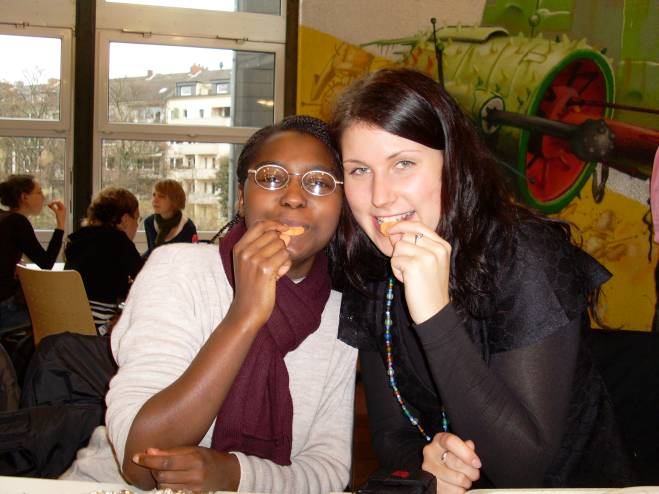SPPA ceased its academic activities and no longer accepts students for study programs.
The Department of Translation Studies which was formed in 1994 prides itself in being the centre of training professionals in the field of translation studies with Bachelor’s Degree Professional Syllabus accredited in December, 2008 and Master’s Degree Professional Syllabus accredited in 2008. Study direction "Translation" (bachelor's and master's programmes) acredited in 2013. The higher school obtained permanent accreditation in June, 2001.
Report (2013/2014) - click here.
The programmes we are offering are as follows:
I. BA Professional in Translation Studies
Interpreter, translator.
Forms of study:
- Day and evening departments
- Latvian and Russian groups.
The Department offers the following languages:
- First foreign language: English, German, Latvian, Russian, French.
- Second foreign language: French, German, English, Spanish.
- Optional third foreign language according to students’ choice.
Period of studies:
- Day department: 4 years (in-service training included);
- Evening department: 4.5 years (in-service training included) - if language proficiency is not enough the students have to study for 1 year (the preparatory department) before their enrollment.
Testing:
- Assessment of applicant’s personal characteristics;
- Assessment of language proficiency in foreign and native languages;
- Assessment of computer skills.
The Higher School also has French, English, German language clubs, drama groups, art galleries, psychological studies, creative workshops.
Description of the professional programme “Interpreter, translator”
Goals of the programme:
- to train qualified experts in various fields of national economy, government and municipal institutions for any organisation, office and business. As to training interpreters, translators and assistants we ensure seven aspects of professional competence (overall culture, working language, native language, cross-cultural communication, habits of scientific work, professional and personality development);
- to train professionals competitive in changing and dynamic environment and market conditions;
- to ensure the level of training for our students allowing them to continue their studies for MA at universities of Latvia and abroad.
Objectives of the programme:
- to provide theoretical and practical knowledge of languages based on the recent theories and methodologies of the European countries, taking into account the recommendations of the Living Languages Centre (Graz, Austria, which operates within the framework of the European Council);
- to develop the skills of cross-cultural communication, interpersonal relationships and other subjects, consolidating general and professional competence of novices;
- to improve the knowledge of the students’ native tongue;
- to initiate creative activity of a personality to carry out scientific and applied research work with both staff and students involved;
- to regularly update material resources (text-books, methodical aids, audio materials, video films, video fax in cooperation with the L.Pasteur University, France, DAAD, the Joensüu University in Finland, etc.), following the newest technologies and theoretical literature;
- to form our teaching staff by involving academic personnel and professional interpreters, to take care of the academic and scientific qualifications of the teaching staff; to promote cooperation with other higher schools in Latvia and abroad;
- to develop further cooperation with the employers considering the real working environment, demands, competitive offers and the information needed in the sphere of the translation services;
- to improve a flexible and efficient management system of the training process;
- to improve the training quality of would-be translators; to go on with the extension work of the Good Offices to consolidate the students’ skills and habits and to make them cooperate with students and teachers from other faculties of the Institute, and wider public. By means of the Good Offices we can check the training quality of the novices.
The acquisition of the professional programme is designed for 4 years (8 terms). Besides, there is a four-month probation period.
Independent Work of Students
The study of foreign languages takes place within the general context of the students’ personality development and depends on their personal orientation and possibilities. It is important to work with the students inciting them to positive emotionality and useful work for the country and society, with respect for their positive desires and attention to their problems, to help them do them do away with unclear items, making the novices accustomed to self-control and the feeling of self-criticism.
The process of studies can be much more efficient if the student assumes a part of responsibility for their implementation both in terms of their contents and selected methods. The primary factors that take our interest in the arrangement of the students’ independent work are students’ autonomy, motivation of their activities, self-evaluation and mutual control of the results of studies. On the whole, appreciable quantity of credit points (including training practice) has been envisaged for the entire independent work.
Great importance in the arrangement of students’ independent work at the Department of Translation studies is attached to the Centre of Language Resources (CLR).
II. MASTER’S DEGREE PROGRAMME
MA programme “Methods of Translation” addresses issues of multilingual translation in an extensive range of languages - English/German/Latvian/Russian, and ensures the training of the following professionals - translator, interpreter with the opportunity to improve the translation skills in the following languages - English/German/Latvian/Russian/French
The format of studies: Full-time and part-time Russian and Latvian groups.
Studies period:
- from 2 to 2.5 years (depends on the type of studies);
- the payment is made once a year, half a year or quarterly;
- students’ exchange takes place under Socrates and Erasmus programmes.
Admission regulations: The undergraduate applicants are to have BA (qualification of an interpreter/translator). Admission will be assessed according to the results of interviews and tests passed.
Testing
- Assessment of the level of competence of foreign and native languages;
- diagnostics of computer skills;
- assessment of the personal features of an applicant.
The amount of credit points of the programme is 80 (contact classes and independent work).
Post Scriptum:
- The students have to get a proper amount of credit points envisaged for every course, provided, that they
- Perform all required tasks in time and completely
- Attent 4/5th of every course classes.
III. Links
The faculty has international cooperation with many European and Latvian organizations and educational institutions. Foreign guest lecturers permanently work at the faculty.
- International (of Europe)
- University of Lyon, France
- University of KÖLN, Germany
- University of Milan, Italy
- University of Joensuu. Savonlinna, Finland.
- European University Centre. SPIRAL. Cross-University Pedagogic Centre.
- ARIC (Association of cross-cultural researchers), Geneva
- DAAD (Deuscher Akademischer Austauschdienst).
- University of Kaluga, Russia.
Local state bodies and other institutions:
- The Ministry of Education of Latvia.
- Association of foreign Languages Teachers of Latvia (Department of French).
- French Embassy in Latvia.
- Daugavpils University.Higher School of Social technology.


























